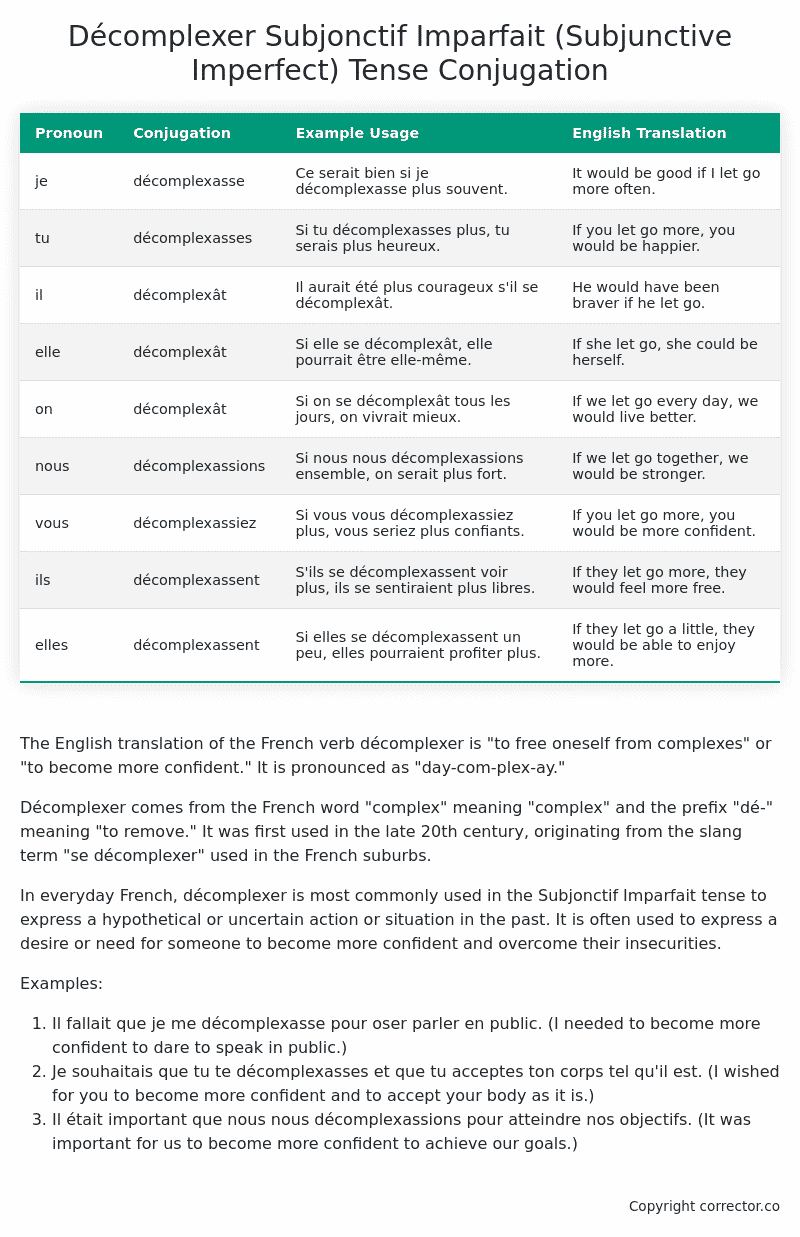Subjonctif Imparfait (Subjunctive Imperfect) Tense Conjugation of the French Verb décomplexer
Introduction to the verb décomplexer
The English translation of the French verb décomplexer is “to free oneself from complexes” or “to become more confident.” It is pronounced as “day-com-plex-ay.”
Décomplexer comes from the French word “complex” meaning “complex” and the prefix “dé-” meaning “to remove.” It was first used in the late 20th century, originating from the slang term “se décomplexer” used in the French suburbs.
In everyday French, décomplexer is most commonly used in the Subjonctif Imparfait tense to express a hypothetical or uncertain action or situation in the past. It is often used to express a desire or need for someone to become more confident and overcome their insecurities.
Examples:
- Il fallait que je me décomplexasse pour oser parler en public. (I needed to become more confident to dare to speak in public.)
- Je souhaitais que tu te décomplexasses et que tu acceptes ton corps tel qu’il est. (I wished for you to become more confident and to accept your body as it is.)
- Il était important que nous nous décomplexassions pour atteindre nos objectifs. (It was important for us to become more confident to achieve our goals.)
Table of the Subjonctif Imparfait (Subjunctive Imperfect) Tense Conjugation of décomplexer
| Pronoun | Conjugation | Example Usage | English Translation |
|---|---|---|---|
| je | décomplexasse | Ce serait bien si je décomplexasse plus souvent. | It would be good if I let go more often. |
| tu | décomplexasses | Si tu décomplexasses plus, tu serais plus heureux. | If you let go more, you would be happier. |
| il | décomplexât | Il aurait été plus courageux s’il se décomplexât. | He would have been braver if he let go. |
| elle | décomplexât | Si elle se décomplexât, elle pourrait être elle-même. | If she let go, she could be herself. |
| on | décomplexât | Si on se décomplexât tous les jours, on vivrait mieux. | If we let go every day, we would live better. |
| nous | décomplexassions | Si nous nous décomplexassions ensemble, on serait plus fort. | If we let go together, we would be stronger. |
| vous | décomplexassiez | Si vous vous décomplexassiez plus, vous seriez plus confiants. | If you let go more, you would be more confident. |
| ils | décomplexassent | S’ils se décomplexassent voir plus, ils se sentiraient plus libres. | If they let go more, they would feel more free. |
| elles | décomplexassent | Si elles se décomplexassent un peu, elles pourraient profiter plus. | If they let go a little, they would be able to enjoy more. |
Other Conjugations for Décomplexer.
Le Present (Present Tense) Conjugation of the French Verb décomplexer
Imparfait (Imperfect) Tense Conjugation of the French Verb décomplexer
Passé Simple (Simple Past) Tense Conjugation of the French Verb décomplexer
Passé Composé (Present Perfect) Tense Conjugation of the French Verb décomplexer
Futur Simple (Simple Future) Tense Conjugation of the French Verb décomplexer
Futur Proche (Near Future) Tense Conjugation of the French Verb décomplexer
Plus-que-parfait (Pluperfect) Tense Conjugation of the French Verb décomplexer
Passé Antérieur (Past Anterior) Tense Conjugation of the French Verb décomplexer
Futur Antérieur (Future Anterior) Tense Conjugation of the French Verb décomplexer
Subjonctif Présent (Subjunctive Present) Tense Conjugation of the French Verb décomplexer
Subjonctif Passé (Subjunctive Past) Tense Conjugation of the French Verb décomplexer
Subjonctif Imparfait (Subjunctive Imperfect) Tense Conjugation of the French Verb décomplexer (this article)
Conditionnel Présent (Conditional Present) Tense Conjugation of the French Verb décomplexer
Conditionnel Passé (Conditional Past) Tense Conjugation of the French Verb décomplexer
L’impératif Présent (Imperative Present) Tense Conjugation of the French Verb décomplexer
L’infinitif Présent (Infinitive Present) Tense Conjugation of the French Verb décomplexer
Struggling with French verbs or the language in general? Why not use our free French Grammar Checker – no registration required!
Get a FREE Download Study Sheet of this Conjugation 🔥
Simply right click the image below, click “save image” and get your free reference for the décomplexer Subjonctif Imparfait tense conjugation!

Décomplexer – About the French Subjonctif Imparfait (Subjunctive Imperfect) Tense
Formation
Common Everyday Usage Patterns
Interactions with Other Tenses
Subjonctif Présent
Indicatif Passé Composé
Conditional
Conditional Perfect
Summary
I hope you enjoyed this article on the verb décomplexer. Still in a learning mood? Check out another TOTALLY random French verb conjugation!


